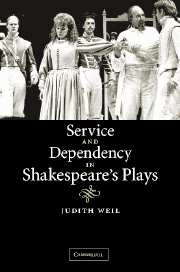7 - Epilogue: Some reflections on the Porter
Published online by Cambridge University Press: 22 September 2009
Summary
Unless the actor doubles in another role, one of Shakespeare's most memorable servants would not be theatrically visible when Dunsinane falls. What does the Porter have to do with questions of freedom, service and slavery in Macbeth? Unlike the numerous domestic messengers, attendants, torch-bearers, and servers who have already appeared at Inverness, engaged in their tasks, the Porter has the stage wholly to himself and can prevent us from taking his work for granted. Will he ever get around to opening that door? Will he exercise his role of watchful guardian and find out who is eager to come in? How long will he “stop up th' access and passage to remorse,” the imminent public discovery, by way of another door, that Duncan lies murdered? As far as the Porter himself is concerned, he is invisible and can therefore turn his occupation into a game for his own enjoyment. This simply does not happen in other plays where comic receptionists please themselves by wittily delaying the access of one character to another. Characters like Launcelot Gobbo in The Merchant of Venice or Margaret in Much Ado About Nothing try to get attention by showing off, but until the Porter grows cold and opens the door, such conventional responses to a comedy of obstruction need not develop.
Because he is alone while he entertains himself and the audience, the Porter seems like an exception to one of the rules proposed in this study: service generally functions in relation to other dependent roles.
Information
- Type
- Chapter
- Information
- Service and Dependency in Shakespeare's Plays , pp. 146 - 148Publisher: Cambridge University PressPrint publication year: 2005
